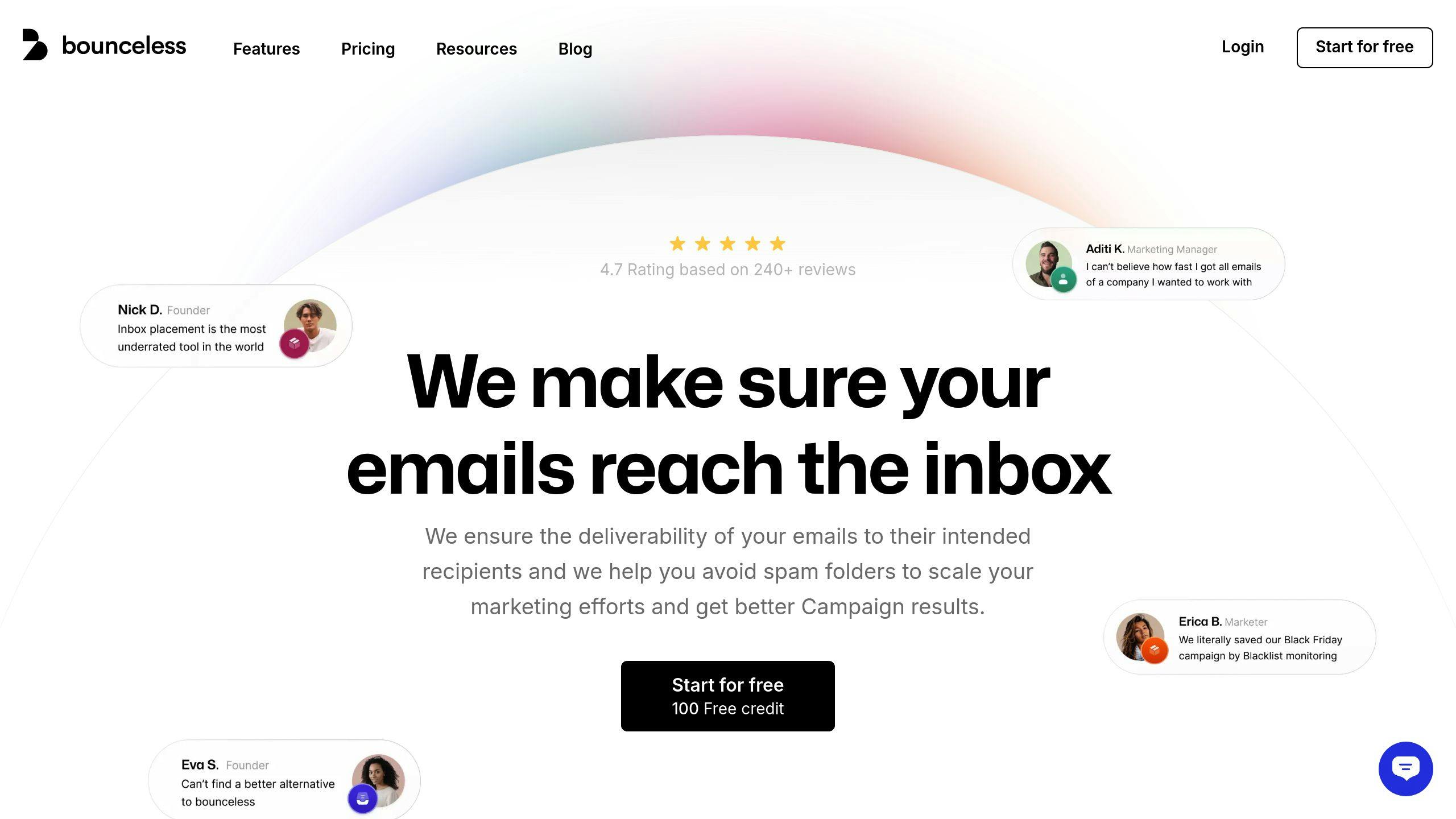Third-party audits are essential for ensuring email compliance with regulations like GDPR, CAN-SPAM, and CCPA. These audits provide an unbiased evaluation of your email practices, helping you avoid legal penalties, protect your reputation, and improve email deliverability. Here’s why they matter and what they involve:
- Why Email Compliance is Critical: Non-compliance risks include fines up to €20 million, data breaches (affecting 71% of organizations), and reputational damage.
- Key Regulations Covered: GDPR (consent and data security), CAN-SPAM (commercial email rules), and CCPA (data rights for California residents).
- Benefits of Audits:
- Identify compliance gaps and risks.
- Improve sender reputation and email performance.
- Ensure proper consent and secure data handling.
How It Works:
- Choose experienced auditors familiar with compliance laws.
- Define audit goals and scope (e.g., data collection, list quality, security).
- Address findings with actionable recommendations.
Tools like Bounceless.io can support compliance by cleaning email lists and verifying data accuracy. Regular audits combined with training and monitoring tools help organizations stay ahead of evolving regulations and maintain trust with their audiences.
Advantages of Third-Party Audits for Email Compliance
Unbiased Compliance Evaluation
Third-party audits provide an impartial look at your email compliance. Unlike internal reviews, these audits can highlight gaps you might overlook. Auditors compare your email practices to regulations like GDPR, CAN-SPAM, and CCPA, helping ensure you're meeting all necessary standards. This outside perspective is key to staying on track with compliance.
Spotting and Addressing Risks
Audits take a systematic approach to identify risks that could harm your compliance efforts. Professional auditors focus on critical areas, as shown below:
| Risk Category | What Auditors Examine |
|---|---|
| Data Collection | Consent mechanisms |
| List Quality | Invalid emails and spam traps |
| Security Measures | Data access controls |
| Documentation | Record-keeping practices |
By pinpointing vulnerabilities, such as unclear consent processes or weak data controls, auditors help you address issues before they escalate into regulatory problems [4].
Improving Deliverability and Sender Reputation
Compliance audits don't just keep you in line with regulations - they also boost email performance. Strong compliance practices can lead to better deliverability rates and protect your sender reputation. As one expert puts it:
"Consent is a fundamental principle of GDPR email rules" [5].
Audits contribute to this by:
- Verifying consent records
- Cleaning up invalid email addresses
- Ensuring anti-spam measures are in place
- Suggesting strategies for maintaining a healthy email list
When combined with ongoing compliance tools, these audits help improve both your adherence to regulations and the overall success of your email campaigns.
Process of Third-Party Email Compliance Audits
Choosing an Auditor
When picking a third-party auditor, focus on their expertise in email systems and data security. They should have a deep understanding of GDPR, CAN-SPAM, and CCPA regulations, along with experience working with businesses like yours. It's also important to ensure they use a clear and organized approach to evaluate compliance. A skilled auditor can pinpoint vulnerabilities in your email marketing efforts and help you stay compliant.
Planning and Defining Audit Scope
A solid audit reviews both your technical systems and operational processes. This usually includes areas like how you collect data and get consent, manage email lists, enforce security protocols, and work with vendors. Define specific goals and deadlines to make sure every compliance requirement is checked [1]. A well-planned scope ensures the audit delivers meaningful insights and practical recommendations.
Audit Findings and Recommendations
Auditors highlight compliance issues, assess risks, and offer practical steps to improve your email compliance. Their approach helps you address gaps, focus on high-risk areas, and allocate resources wisely.
Key steps for implementation include:
- Documenting compliance gaps
- Ranking issues by their impact
- Setting timelines for fixes
- Assigning responsibilities for each task
Tools like Bounceless.io can assist by verifying emails and cleaning lists, ensuring your data meets quality standards. Follow-up audits are essential to confirm that changes have been implemented and are working effectively [1][3].
Tools for Supporting Email Compliance
Bounceless.io: Email Verification and List Cleaning

Email verification tools play a key role in maintaining compliance with data protection regulations. Bounceless.io offers features designed to address these needs. For instance, its spam trap detection helps protect sender reputation in line with CAN-SPAM rules, while domain validation and email verification support GDPR's focus on data accuracy. Additionally, the platform processes data in a way that aligns with GDPR's privacy standards.
Here’s what Bounceless.io brings to the table:
- GDPR-compliant data processing
- Spam trap detection to safeguard sender reputation
- Domain validation and DNS record checks
- Real-time API integration with email platforms
While Bounceless.io specializes in email verification and list cleaning, other tools are available for broader compliance monitoring and data management.
Compliance Monitoring Tools
Compliance monitoring tools are designed to track adherence to regulations in real time. They offer features such as:
| Feature | Compliance Function |
|---|---|
| Consent Tracking | Keeps verifiable records of user consent |
| Data Collection Monitoring | Ensures only necessary data is collected |
| Breach Detection | Identifies and allows rapid response to compliance issues |
These tools are ideal for real-time tracking, while privacy management systems provide a more comprehensive framework for secure data handling.
Data Privacy Management Systems
Data privacy management systems are the backbone of email compliance. They offer features like:
- Encrypted data storage
- Automated consent workflows
- Handling of data requests
- Audit-ready documentation
When choosing a system, it’s wise to focus on platforms that prioritize data minimization and strong encryption to meet GDPR standards [2][4].
"GDPR wasn't the first regulation to attempt to clean up the world of email marketing, but it was the first that had real teeth and the promise that it would bite if marketers didn't comply." - Mailjet, 2022 [4]
These tools not only help maintain compliance but also simplify third-party audits. Regular updates and consistent monitoring ensure alignment with changing regulations while improving the efficiency of email marketing efforts.
Strategies for Ongoing Email Compliance
Regular Internal Audits
Internal audits play a key role in keeping email practices compliant. They allow businesses to spot potential problems early, reducing the risk of regulatory violations. These audits should cover areas like managing consent, controlling access, handling data, and maintaining proper documentation.
While audits highlight gaps, consistent employee training ensures everyone follows compliance guidelines effectively.
Training on Compliance
Employees need a clear understanding of how regulations like GDPR, CAN-SPAM, and CCPA apply to their daily email tasks. Training should cover GDPR’s consent rules, correct ways to handle data, and proper documentation procedures. Using real-world scenarios during training can make these concepts easier to grasp and apply.
Beyond training, staying aware of changes in regulations is critical for ongoing compliance.
Keeping Up with Regulation Changes
Tracking updates to email regulations requires a proactive approach. Organizations should monitor industry news, attend relevant conferences, and review policies regularly to stay ahead. This helps ensure timely updates to compliance processes.
To make this easier, businesses can integrate compliance monitoring tools into their email systems. These tools provide real-time tracking of compliance metrics, helping identify and address issues before they lead to penalties. Regularly reviewing these metrics also offers insights for refining compliance strategies and improving overall email practices.
Conclusion: Importance of Third-Party Audits in Email Compliance
Third-party audits play a key role in ensuring organizations meet email compliance standards in an increasingly regulated environment. These independent reviews assess email practices against major regulations like GDPR, CAN-SPAM, and CCPA, helping businesses spot and address compliance issues before they lead to bigger problems [4]. They also help reduce the risks of financial penalties and reputational harm tied to non-compliance.
Non-compliance can be costly, both financially and in terms of trust. Regular audits act as a safeguard, ensuring organizations follow proper data collection protocols and maintain clear consent records [4].
Tools like Bounceless.io work hand-in-hand with audit recommendations, helping maintain clean email lists and protecting sender reputation - key factors for meeting GDPR requirements and improving email deliverability.
As data privacy laws like CCPA and CPRA evolve, third-party audits become even more important. These audits provide actionable advice for updating compliance strategies and keeping email practices aligned with changing regulations.
While GDPR doesn’t explicitly mandate third-party audits, they’re a proactive way to show compliance and build trust with stakeholders [2][4]. Combining audits with tools and staff training creates a well-rounded compliance strategy that safeguards both business interests and subscriber privacy.
In short, third-party audits are a smart investment for organizations navigating the complexities of global data protection laws. They help identify risks, refine email practices, and maintain long-term compliance, all while strengthening trust with audiences.
FAQs
Are audits required under GDPR?
GDPR doesn’t specifically require third-party audits, but they’re widely seen as a smart way to ensure compliance. The CookieYes GDPR Compliance Guide explains:
"A GDPR compliance audit is a critical tool for ensuring robust data protection and regulatory adherence."
Audits help examine areas like data processing practices, consent records, security protocols, and any gaps in compliance. They also provide clear recommendations for improvement. For email marketing, audits are especially important to confirm that all email contacts were obtained with proper consent.
If you’re working with inherited email lists and aren’t sure how the data was collected, conducting an audit should be a top priority. This will help you identify compliant data and avoid risks tied to questionable records.

